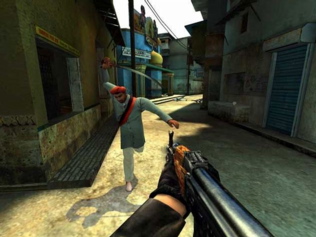We are developing the social individualist meta-context for the future. From the very serious to the extremely frivolous... lets see what is on the mind of the Samizdata people.
Samizdata, derived from Samizdat /n. - a system of clandestine publication of banned literature in the USSR [Russ.,= self-publishing house]
|
In the course of my duties as a occasional and strictly-when-I-feel-like-it culture blogger, I watched, with a view to commenting on, a short profile that was shown on BBC2 TV last Monday night about the great conductor/pianist Daniel Barenboim, a musician I’ve admired and enjoyed the recordings of ever since I first heard him in the nineteen sixties. The show only lasted half an hour and there wasn’t time for much to be said, but one very interesting thing was said, by conductor/composer Pierre Boulez, who, perhaps somewhat surprisingly (trad classical musician versus enfant terrible avant guardist, etc.), is a close friend of Barenboim’s, as well as a musical collaborator from way back.
Boulez pointed out that Barenboim is unusual in being a musician whose repertoire and general interest in the world and its affairs have both broadened over the years rather than narrowed. And it’s true. The typical top-flight classical music career starts in a blaze of somewhat indiscriminate fireworks and political pontifications, and then as age sets in our wunderkind becomes a not quite so wunder-mensch, cuts out the political posturing and the extraneous repertoire, and homes in on a gradually diminishing core of favourite pieces, and then disintegrates and dies.
Barenboim is doing the opposite. He started out as your typical sheltered prodigy who loved the great classics of classical music to distraction, and ignored just about everything else. But his repertoire has never stopped expanding, and simply as a result of being an A-list classical musician, and especially in his capacity as boss of one of the Berlin opera houses in the years since unification, he has found himself reflecting, if not quite on the wider world as such then most certainly on the place of classical music within that wider world. (You don’t conduct the first Wagner ever played in public in the state of Israel without thinking about that very carefully!)
To this end, he writes. Go to his website (see the link above) and you’ll see what I mean.
Barenboim is not an actual blogger. He is no daily diarist. Nevertheless, his writings are referred to at his website as a “journal”, and had this site been set up only a few years later, it might have included a bona fide blog. After all, these classical musicians are having to sing for their suppers, to fight for their arts council grants and their permanent recording contracts, and they know it. (And if your appetite for supper is anything like Barenboim’s, you really have to sing, let me tell you. Old style opera in the newly wilting German economy. That’s one hell of a sell.)
So, Barenboim writes. My question is: are any genuine Barenboim-level celebs actually finding the time to blog, in approximately the kind of way that we guys do?
I rule out writers, because that is not enough of a sideshow to really be a sideshow. But how about sportsmen? Do any movie stars blog? Perry mentions film producer/occasional blogger Brian Linse here from time to time, and he could become very famous if things go well for him. But, unsurprisingly, Linse seems like he’s too busy to put frequent postings on his blog. Either that, or he just can’t match that Barenboim level of energy. (Few can, let me tell you. That’s no big criticism.)
I’m guessing that some pop stars blog. But are they any good? Also, I tend to discount them because, if they write lyrics, that sort of makes them writers too.
But that’s my question. Who is the most famous blogger? Not famous for blogging, but who happens to blog about the life that does make him or her famous. Anyone?
If you have a spare half hour, you might consider reading a long essay by Bill Whittle entitled CELEBRITY (on Eject! Eject! Eject!) about silly Hollywood stars mouthing off about politics and not being challenged by the media but just being allowed to say it and get clean away with it. Power without responsibility, the prerogative of the whore throughout history, as I seem to recall a pre-WW2 British Prime Minister once saying about the media themselves, of his time.
Example: Viggo Mortensen. He played a good guy in Lord of the Rings, but is now, it seems, batting for the bad guys, arguing for “peace”, that is to say for the rights of despots not to be knocked off their perches, and the duty of the victims of despots to just go on suffering indefinitely. Apparently Mortensen recently said that many more people died in Afghanistan as a result of the US bombing there than the (just under) 3,000 who died in 9/11 attack on New York, when the true Afghanistan number is generally reckoned now to be about 500. As Whittle says, this person should most emphatically be allowed to say such things, but only in a world where the Viggo Mortensens of it are used to being worshipped, regardless of what they say, do such things get said by them so loudly.
There are many interesting responses one might have to this long essay of Whittle’s, but one of the more interesting things about it for me is that it is indeed long, around twenty or so scrollings-down of my computer screen. But since Whittle was nailing down a whole cart-load of thoughts that many others were three-quarters of the way to nailing down for themselves, many people, including me, found it great reading, and just kept reading and reading until they finished it. When I started work on this posting there were already 68 comments, and now as I’m giving this its final polish there are 73, so I definitely am not the only one to have read this thing.
What I think this demonstrates is that blogging is not a particular way of writing; it is just a technology to enable writing. How you do the writing is up to you. Samizdata has half a dozen postings or so per day, of Samizdata type length. That’s us. Whittle has pieces of very variable length, from Samizdata-short to massive, every day or two, with absolutely none of those rat-tat-tat fusillades of very short postings that Instapundit specialises in. That’s him, and that’s Instapundit. Blogging doesn’t have to be done any particular way, except that, I would say, it helps a lot if you can find a way of doing it that suits you, and you then stick to it. Sustainability is all. But I guess if you’re good enough you can even break that rule. I seem to recall writing here about this before. Yes. Do I now contradict myself? Somewhat.
One final thought. Those 68 rising to 73 comments included some interesting speculations about the possibility that saying things which are way to the left of regular public opinion might actually harm an actor’s career by making the regular public stay away from his/her movies, with, in particular, Alec Baldwin’s recently faltering movie progress being put under the spotlight. So, I wonder what will now happen to Viggo Mortensen’s career. Will all those working stiffs on aircraft carriers whom Whittle writes about so vividly and respectfully, and their millions of land-locked ideological brethren, want to see Mortensen pretending to be someone like them (or like they’d like to be), when he has now so plainly declared that actually he isn’t one of them in any way except physiology (or physiological aspiration)? I genuinely don’t know, and will be genuinely interested to see.
After playing some excellent games like tongue-in-cheek No One lives Forever 2 and the the awesome & ultra slick Splinter Cell, I was starting to get the impression computer games were starting to really enter another era: an era in which equal attention is paid to scripts, story flow, voice acting and the ability to interact other than by shooting someone.

Splinter Cell: ultra cool
Shoot people, be stealthy, climb, jump, sophisticated interaction…
take hostages and extract information without saying ‘please’!
Boy was I wrong! Having just played Soldier of Fortune 2, I realise that even quality companies like Raven can produce clunkers. SoF2 is as linear and predictable as the original Doom, the cut scenes are filled with flat and indifferent declaiming and the characters are cliches (in itself sometimes amusing but in this case, not). Even the graphics are nothing to write home about. Level design ranged from uninspiring (“Ah, yet another blind corner… I might as well chuck a grenade as there is bound to be a bad guy lying in wait like the one before. And the one before that. And the one before that…”) to the idiotic (as in ‘my allies will try and kill me if I get too far ahead or behind the patrol I am helping to defend’…. riiiiiight) to the baffling (‘so I shot the guard dead with a silenced weapon, he was nowhere near the bloody alarm button and the alarm goes off anyway instantly? And the logic behind that is…??’).

Soldier of Fortune 2: suspect moustache
Shoot people, occasionally push buttons, try to hide (almost impossible)
plus shoot some more people… and then some more. And again…
I guess that the SoF & Raven brand names are responsible for the game’s excellent sales and I gather that multiplayer in reasonable in SoF2, but I would certainly urge anyone who likes a good plot line, thoughtfully designed scenarios or snappy dialogue in a single player game to look elsewhere and give this by-the-numbers First Person Shooter a miss… Deus Ex or Half Life this game ain’t.
“The music industry has current employment opportunities for photo retouchers”, Joe S Tallin, a music industry representive, stated in Moscow today. “We’re looking for experienced people, and we’ve found most of our best people over here. They’ve got many years of experience in history modification and were thoughtlessly thrown on the scrap heap to fend for themselves. Those of us doing this in the West are just beginning to learn the art”.
Joe added, unofficially, future projects will include replacing John Lennon with Robbie Williams on a number of old album covers. “It’s just like the Lenin Mausoleum, or dead Russian Cosmonauts” he added. “You have to continuously update the past to reflect the market of today”.
For those who have not run across the story, new copies of the Beatles famous Abbey Roads album cover have had a cigarette digitally removed.
It’s final. Instapundit reports DeCSS (a DVD encryption unscrambler) is legal… if you live in the free world.
We send our heartfelt congratulations to the author of DeCSS, Jon Lech Johansen, on his acquittal and total victory over the forces of evil.
Computer games are evolving at an astonishing rate, acting as the primary driver of desktop computer development (after all, how many people actually need a 2.5 GHz CPU, a 128 Mb graphics card and 512 Mb of RAM to do word processing and spreadsheet work?)
Back in the Paleolithic age of computers (the 1980’s), computer games looked like this…

Wolfenstein: Shoot! Mild fun… but not for long
Mildly amusing but crude in the extreme. By the early 1990’s however, came the advent of the ‘FPS’: the First Person Shooter!

Wolfenstein 3D: Shoot! Great fun… but not for long
They seemed astonishing at the time, actually putting you inside the gun wielding hero. The graphics were rather basic, to put it mildly and after a while the lack of multifaceted interaction tended to make the games rather tedious after the initial ‘gee whiz’ factor wore off… other than opening doors, the only way to interact with things was to shoot at them.
My goodness how things have changed!
Wolfenstein 3D begat Doom, which begat Quake, Hexen, Marathon, Unreal, Duke Nukem, Tomb Raider etc, etc… all worthy ‘shooters’ of steadily increasing graphic quality.
Sudden surges came with games like Half Life, released at the end of the computer games neolithic era (1998) and yet still playable now…and featuring not just excellent graphics but Artificial Intelligence which actually shows a bit of intelligence, rather than just a desire to commit virtual suicide… Half Life & the spin-offs Blue Shift and Opposing Forces brought also the ability to ‘talk’ with the computer generated denizens of the game as opposed to just shoot at them.

Half Life: Don’t shoot, he is on your side.
Great fun… for hours on end!
Then games like No One Lives Forever (NOLF), a spy thriller set in the 1960’s with frequent plot specific cut scenes came along, and suddenly the story line of the computer game actually started to matter.

NOLF: Cate Archer, at the grave of her ‘dead’ mentor
The next generation of releases saw the success of story intensive NOLF and soon games of almost cinema grade plot and characterization started appearing, such as the conspiracy ladened Deus Ex and then the gritty darker than dark Max Payne.
And so yesterday the new Gamespy PC Game of the Year was announced, and it is the excellent No One Lives Forever 2.
As well as being superb graphically (caveat: you do need a high spec computer to get the best out of this game), it is just down right funny! Set in the 1960’s, this ‘spy shooter’ owes more to the wonderfully camp ‘Man from U.N.C.L.E.’ than James Bond or Smiley’s People. Although slightly more ‘serious’ than Austin Powers (but only slightly), it provides endless entertainment by allowing you to eavesdrop on the all-too-believable conversations of other people.

NOLF2: This Indian H.A.R.M. agent has a sword…
but Cate has a Kalashnikov
I look forward to continuous progress in computer games… pure distilled essence of capitalism married to explosive creativity. Within a few years, interactively with the virtual environment will be almost total, opening up steadily more ambitious story telling possibilities whilst at the same time the holy grail of photorealism comes closer to realization. The future is so bright, we are going to need shades to see it. I can hardly wait!
Youthful policeman are a standard yardstick of personal maturity and you really know that middle age is looming when politicians begin to look ‘fresh-faced’. However, there is nothing quite like the passing of your teenage rock ‘n’ roll idols to have you looking in the mirror and counting those grey hairs.
“Joe Strummer, lead singer of seventies punk band The Clash, has died at the age of 50.”
‘The Clash’ provided the background music for my student years. I loved them. R.I.P Joe and thankyou.
Michael Blowhard hits a very important nail on the head with this:
In fact, art and science have little in common. However much science is influenced by such factors as personality and culture, it’s empirically based; it’s testable. The powder goes ka-boom when a match is touched to it or it doesn’t. Actual progress is made; disputes between rival views are finally adjudicated. If you understand the science of today, you basically understand all of science. (And let’s set aside for the moment the kind of babble about “uncertainty” and “chaos” that art intellectuals love to indulge in. As far as I can tell, they’ve got no better a grasp on the scientific meaning of those terms than I do.)
In art, none of this is the case. Testable? Well, the success of “Star Wars” certainly demonstrated something about what movie audiences were ready for in the mid-’70s, but “McCabe & Mrs. Miller” has probably meant more to actual filmmakers. A lost weirdo painter (Henry Darger) is discovered and causes a sensation; a previously unknown art tradition (Tuva singing, for instance) gains notice. A prominent artist – Longfellow, for instance – is forgotten.
In the field of art, all this is normal. In science, it wouldn’t be. A great discovery remains a great discovery; and no one’s reviving the theory of phlogiston.
There were various comments afterwards trying to say that science is more like art than people think. But people (and Michael) are right and these commenters are wrong. Science is all about communal progress. Art is all about individual responses. Scientific theories compete according to which of them, in the collective opinion of the scientific community, constitutes the most progress. That science progresses, in the words of one of these commenters, “one funeral at a time” just means that scientists can be stubborn idiots, not that science is a matter of subjective individual whim. Truth, in the end, is a communal matter. The truth is what you and I and everybody else who is paying attention have, in the end, to agree about. Artistic excellence on the other hand …
One commenter even suggested that Michael Blowhard ought to read more Feyerabend. This comment is my nomination for the silliest and most potentially disastrous blog comment of the year 2002. Michael Blowhard’s brain is an important blogosphere resource, but although I’ve never met him I sense that he’s the sort of person who would read Feyerabend, just because some twat anti-philosopher of anti-science had suggested this on Blowhards. Michael might emerge from the experience mentally unscathed, but the downside risk doesn’t bear thinking about.
The importance of all this, as Michael himself explains very well, is that if you do accept that art “progresses”, then you immediately install a “taste mafia” in power who are there to tell you where art is just now, and where it’s been, and where it’s going. After all, if art is like science, that means we all must all defer to the art scientists, doesn’t it? And a vertical third finger to that. Or maybe the second finger also, Agincourt longbowman style.
Tomorrow I hope to be meeting with my Little Man who will be installing my Cullture Blog for me. So far the operation has resembled the sad time about ten years ago or so when I tried to install a shower. While this worked, it had the two standard British shower settings: Far Too Hot and Far Too Cold. Then it stopped altogether. I do hope that my Culture Blog grief is all happening now, and that soon it will start and then just get better and better the way a British shower never would.
The Blowhards have both inspired me and relaxed me about this project. They have inspired me by their very existence, and they have relaxed me by doing a proper culture blog so properly that I don’t have to worry about doing that myself and can just have some fun with my one, as and when I feel inclined.
In among blogging up as much of a storm as I could manage during the last few months, I’ve also been ploughing my way through a book, which I’ve had cause to mention here several times before, but do not apologise at all for mentioning yet again: Peter Hall’s magnificently blockbusting Cities in Civilization.
It is full of delights beyond numbering. Recently I enjoyed a thrill of patriotic pleasure when I got to the end of the chapter dealing with the birth of Rock and Roll (“The Soul of the Delta”).
The Story So Far: Rock and Roll has arisen, in Memphis, as a creative collision, fertilised by the newly active music radio, between Delta Blues and Country and Western. But the New York Los Angeles Axis of Evil (bland pop with no mention of Black People) is fighting back and threatens to submerge R+R in a tsunami of upbeat but basically middle-class woolly cardigans and Christmas albums. But, riding to the rescue, yes, it’s the British Cavalry:
Understood or not, these British groups left no doubt about their debt. Indeed, they went out of their way to record it. When the Beatles first came to America they told everyone they wanted to see Muddy Waters and Bo Diddley; one reporter asked: ‘Muddy Waters … Where’s that?’ Paul McCartney laughed and said, ‘Don’t you know who your own famous people are here?’ Eric Clapton quoted Little Walter, Chuck Berry, Bib Bill Broonzy, Robert Johnson, and Blind Boy Fuller, but above all B. B. King; Muddy Waters was discovered by white America only after the Rolling Stones took their name from one of his tunes. John Lee Hooker understood when he said: ‘It may seem corny to you, but this is true: the groups from England really started the blues rolling and getting bigger among the kids – the White kids. At one time, fifteen years back, the blues was just among the blacks – the old Black people. And this uprise started in England by the Beatles, Animals, Rolling Stones, it started everybody to digging the blues’.
I guess most Americans who care about such things knew this story already, but I didn’t realise this until now. I just thought, you know, the Brits went to America and sold a lot of tickets and a lot of records and got drunk and drugged and had a good time, playing essentially the same kind of stuff as their US rivals. That they played such an important part in the nurturing (if not the birth) of Rock and Roll, I did not know.
It’s a frightening thought that, world impactwise, this is probably about the last truly interesting thing that Britain has done. Are there any other more recent Big Things that have originated in or even been partly done in (like Rock and Roll) this little land of ours? I’d love to be told, but fear that the comments won’t add up to much. (And before Rock and Roll, you have to go back to Bomber Command.)
Our current popsters – and I know I sound like an old fart here but there you are, I am an old fart – are an embarrassment, not just musically to my Rolling Stones trained ear, but also commercially. I’m told that Britpop is doing no business at all in America. Right?
I thought Robbie Williams made a promising start, and I loved his performance of “I Hope I’m Old Before I Die” on Top of the Pops about a decade ago, but his latest single is, I think, as exciting as cold washing up water. I further understand that some Idiot Old Record Company has just paid him 4 billion quid for his next fifty albums. I believe that They Will Regret This.
On the other hand, I bought a DVD of the Rolling Stones recent “Zimmer Frame Tour” (no, the “Bridges to Babylon Tour 97-98”, which is but a blink of an eye ago in Rolling Stones time) and there was a new track on it which I hadn’t heard before, in among the old classics, called “Flip The Switch”, which I thought was great.
Have a nice weekend.
Michael Jennings tackles, albeit only in passing, one of the late twentieth century’s most enduring and to many most mysterious of questions: why did Molly Ringwald, given the excellence of her performances in such fine movies as Sixteen Candles and Pretty In Pink, never make it as big in the movies as she should have? Why, from the late eighties onwards, was the Ringwald career ride mostly down hill?
I think I can throw some light on this problem.

Molly then
Ms. Ringwald was a totally convincing and attractive teenager, certainly from where I was sitting. However, she did have one drawback. She was one of those females who, through no fault of her own, gives the impression of being just one misfortune away from bursting into tears. In a teenager this quality is tolerable, even endearing. Why can’t those bigger boys see what a fine and sweet girl Molly is? Why are those rich bitches from the posh side of the tracks being so nasty to Molly? Poor Molly. Somebody do something. You, handsome rich boy, dump your shallow girlfriend and give Molly a ride in your red Porsche. And as for you Andrew McCarthy, for once in your life show a bit of backbone!
Unfortunately for Molly, however, as teens turned into twenties, and then thirties, and then whatever the lady is now, she still gives off the same victimhood vibe, and whereas this used to tug at the heartstrings; now, on those rare occasions when we still witness it, it merely gets on the nerves. What had formerly seemed innocently melancholy – an artless appeal for aid and comfort – now seems frozen into a manipulative routine that ought to have been caste aside. Girl-girls are fine, one of nature’s greatest bounties. But girl-women? Let’s just say that this is the kind of thing that has to be done right. So when Molly the Woman hove into view, still with the exact same lacrimosity threat problem, the reaction was: Grow up woman. Stop your whining. This is not the stuff of which lady film stars are made.

Molly now
Please understand, Ms Ringwald (after all we’re talking about a woman who may now have time on her hands and could well be reading this – especially if she thinks she might learn from this posting how she could become a movie star), please understand that I am not offering a personal criticism of your personal qualities, which are probably not at all as I have described them. I am talking about your screen persona, the way you come across in the cinema, in front of the cameras. You come across, on screen, as one of life’s victims, and what is worse as a victim not so much of circumstances as of an inadequately developed character. Sorry, but there it is.
(It occurs to me that another bratpacker of that vintage and another would-be movie star, Rob Lowe, now to be seen in the political TV drama “The West Wing”, has suffered in recent years from a rather similar problem. Coming of age, beautiful. Come of age, not convincing. Not the finished article.)
But please understand also, Ms. Ringwald, just how fabulous you were in your all-too-brief years of glory. Sixteen Candles and Pretty In Pink are two of my all time favourite movies.
Remember the days when I was going on here about Brian’s Education Blog, but when there was no actual Brian’s Education Blog to go and look at. Well, now there’s another Brian Blog opening up Real Soon Now: Brian’s Culture Blog. I had been saving this posting or something like it for that. But when Michael opened up the Ringwald issue over at his place I decided that my analysis of this should be made public, now, and of necessity here. I hope that was the right thing to do. As for what’s holding up BCBlog, I won’t mention any real names but will say that the Atlas who carried the load so manfully when BEdBlog was getting started seems, temporarily, to be shrugging.
The Wild West wasn’t just wild, it was a scream:
“Marvel Comics plans to break new ground in the comic book industry by introducing the first openly gay title character in a comic book.
The character will appear in a revival of the 1950s title, “The Rawhide Kid.” Marvel expects a February debut.”
Here’s one gunslinger that will definitely be shooting up the bad guys.
I recommend a longish piece that Michael Jennings has just put up about the truly extraordinary Hollywood machinations which resulted in the three Lord of the Rings movies getting made, by an “insane bearded New Zealander”. I haven’t seen any of these movies, but I enthusiastically concur with this concluding observation:
… At least one insane bearded New Zealander is now insanely rich. And I think a world in which insane bearded New Zealanders can become insanely rich by making ludicrously over-ambitious movies is better than one where this is not the case. …
Quite so. The insane New Zealander is obviously quite a character, but even more extraordinary is the person who produced these movies, someone called Bob Shaye. It’s a real feet-in-the-gutter but eyes-on-the-stars story.
I took the liberty of looking at the Jennings site meter, to see if saying this here could be expected to make any difference to anything. Apparently, it might. I think Jennings deserves a lot more readers than he’s now getting.
|
Who Are We? The Samizdata people are a bunch of sinister and heavily armed globalist illuminati who seek to infect the entire world with the values of personal liberty and several property. Amongst our many crimes is a sense of humour and the intermittent use of British spelling.
We are also a varied group made up of social individualists, classical liberals, whigs, libertarians, extropians, futurists, ‘Porcupines’, Karl Popper fetishists, recovering neo-conservatives, crazed Ayn Rand worshipers, over-caffeinated Virginia Postrel devotees, witty Frédéric Bastiat wannabes, cypherpunks, minarchists, kritarchists and wild-eyed anarcho-capitalists from Britain, North America, Australia and Europe.
|












